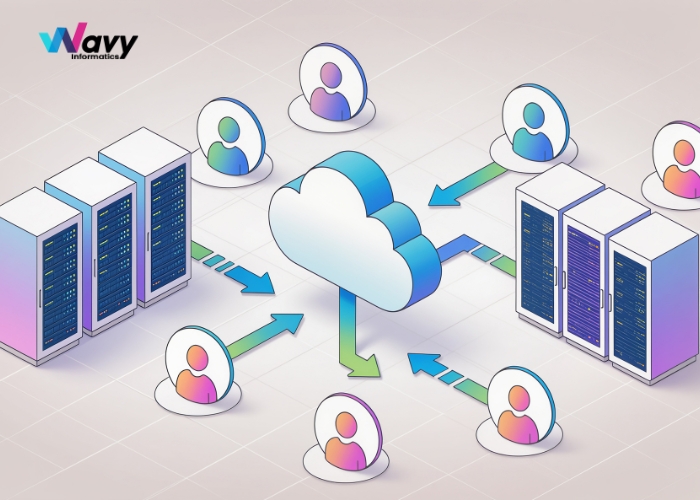
In today’s fast-paced digital world, businesses are constantly seeking innovative ways to stay ahead of the competition. One of the most transformative technologies reshaping the corporate landscape is cloud infrastructure. From startups to large enterprises, cloud computing has become the backbone of modern IT strategies. At Wavy Informatics, we specialize in helping businesses leverage cloud infrastructure to streamline operations, enhance security, and drive growth.
In this blog, we’ll explore how cloud infrastructure revolutionizes the IT world, its benefits, emerging trends, and we will answer frequently asked questions to help you make informed decisions.
Cloud infrastructure refers to the collection of hardware, software, networks, storage, and services that deliver computing resources over the internet. Instead of relying on on-premise servers and traditional IT systems, cloud service providers allow businesses to access scalable computing power and storage.
Cloud infrastructure is no longer a luxury—it’s a necessity for businesses aiming to remain competitive. Here’s how it’s reshaping the IT landscape:
Traditional IT systems require substantial upfront investment in hardware, software, and maintenance. Cloud infrastructure allows businesses to scale resources up or down based on demand, reducing costs and avoiding resource wastage.
Cloud computing follows a pay-as-you-go model, meaning companies only pay for what they use. This eliminates the need for expensive hardware and reduces operational costs, making IT more affordable for businesses of all sizes.
Modern security measures are heavily invested in by top cloud providers. From encryption to multi-factor authentication and regular audits, businesses can protect sensitive data without the complexity of managing on-premise systems.
Cloud infrastructure enables employees to access data and applications from anywhere. This facilitates remote work, global collaboration, and real-time project management, empowering teams to work efficiently from multiple locations.
In the event of a disaster—natural or technical—cloud infrastructure ensures data is backed up and accessible, minimizing downtime and protecting critical business operations.
With cloud-based tools and services, companies can rapidly deploy new applications, test ideas, and innovate without being slowed down by infrastructure limitations. This agility gives businesses a competitive edge in today’s fast-moving markets.
The future of IT is closely tied to cloud infrastructure innovations. Here are some trends to watch:
Absolutely! Cloud computing is cost-effective and scalable, making it ideal for small and medium enterprises looking to leverage advanced IT without huge upfront investments.
Cloud providers implement advanced security protocols including encryption, access control, and regular security audits, making it highly secure. Choosing a reputable provider ensures maximum protection.
Yes! Cloud migration services allow businesses to seamlessly transfer applications, data, and workflows to cloud platforms with minimal disruption.
Unlike traditional IT, which requires on-premise hardware and constant maintenance, cloud computing offers on-demand, scalable, and flexible resources accessible from anywhere.
By centralizing data and applications in the cloud, teams can work together in real-time, share documents, and access applications from multiple locations, enhancing productivity and efficiency.
At Wavy Informatics, we help businesses unlock the full potential of cloud infrastructure. Our services include:
We focus on helping businesses innovate, optimize costs, and drive growth using cutting-edge cloud technologies.
The future of IT is inseparable from cloud infrastructure. It provides scalability, security, cost efficiency, and business agility, enabling organizations to thrive in a digital-first world. Businesses that embrace cloud technologies are better positioned to innovate, compete, and adapt to changing market demands.
Whether you’re a startup looking to scale or an established enterprise seeking modernization, Wavy Informatics is your trusted partner for cloud solutions that drive real business impact.